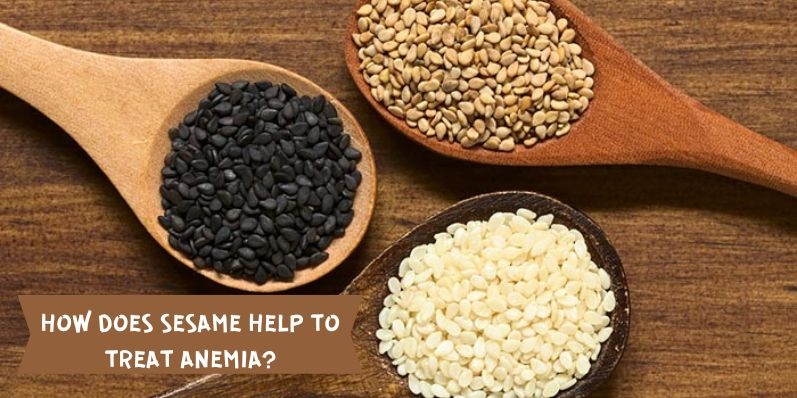
20-07-2023
How does Sesame Help to Treat Anemia?
- Admin
Anemia is a prevalent medical condition that affects millions of people worldwide. It occurs when the body lacks enough healthy red blood cells to carry sufficient oxygen to its tissues. There are various types of anemia, each with its underlying cause, but the common symptoms include fatigue, weakness, and paleness. One promising natural remedy for anemia that has gained attention in recent times is sesame. In this comprehensive Blog, we will explore the benefits of sesame in treating anemia, its nutritional profile, and how it can be incorporated into the diet to boost overall health and well-being.
Understanding Anemia
Before delving into the role of sesame in treating anemia, let's have a brief understanding of this condition. Anemia is often caused by a deficiency of essential nutrients such as iron, vitamin B12, and folate. Other factors contributing to anemia can be chronic diseases, inherited conditions, or issues related to bone marrow and red blood cell production.
The Nutritional Powerhouse: Sesame Seeds
Sesame seeds, scientifically known as Sesamum indicum, are tiny nutritional powerhouses packed with essential vitamins and minerals. These small seeds have been cultivated for thousands of years and have significant culinary and medicinal applications. Sesame seeds are rich in:
1. Iron
Iron deficiency is one of the primary causes of anemia, especially in women and children. Sesame seeds are an excellent source of plant-based iron, making them an ideal addition to the diet for individuals struggling with anemia.
2. Vitamin B6
Vitamin B6 plays a crucial role in hemoglobin production and red blood cell metabolism. Sesame seeds contain an abundance of this vital nutrient, promoting healthy blood cell formation.
3. Copper
Copper is necessary for iron absorption and body usage. By incorporating sesame seeds into the diet, individuals can improve their copper intake, which further aids in combating anemia.
4. Folate
Folate, or vitamin B9, is necessary for DNA synthesis and red blood cell formation. Sesame seeds are a natural source of folate, contributing to overall blood health.
5. Zinc
Zinc is vital for maintaining a robust immune system and assisting in the production of hemoglobin. Sesame seeds contain zinc, which supports the body's fight against anemia.
Sesame and Its Role in Anemia Treatment
Sesame seeds have long been used in traditional medicine for their therapeutic properties. Recent research has shed light on the potential benefits of sesame in treating anemia and improving overall blood health. Here's how sesame helps combat anemia:
1. Iron-Rich Food
Sesame seeds are an excellent plant-based source of iron. Incorporating them into the diet can help replenish iron levels in the body, reducing the risk of iron-deficiency anemia.
2. Hemoglobin Boost
The abundance of vitamin B6 in sesame seeds aids in the production of hemoglobin, the protein responsible for carrying oxygen in red blood cells. Adequate hemoglobin levels are vital to combat anemia effectively.
3. Enhanced Copper Absorption
Copper is required for iron absorption and utilization in the body. Sesame seeds, with their copper content, ensure that the iron consumed from other sources is effectively absorbed, benefiting those with anemia.
4. Folate for Healthy Blood Cells
Folate is crucial for the formation of healthy red blood cells. Including sesame seeds in the diet provides a natural source of folate, supporting the body's ability to create robust blood cells.
5. Supporting the Immune System
Zinc, found in sesame seeds, plays a role in maintaining a strong immune system. Anemia can weaken the body's defenses, but sesame seeds' zinc content helps bolster immunity during the recovery process.
How to Incorporate Sesame into Your Diet
Adding sesame seeds to your daily diet is easy and can be both enjoyable and nutritious. Here are some delicious ways to include sesame seeds in your meals:
1. Sesame Seed Sprinkles
Sprinkle roasted sesame seeds on top of salads, soups, or stir-fries to add a nutty flavor and a nutritional boost.
2. Tahini Sauce
Tahini, a paste made from ground sesame seeds, is a popular ingredient in various Middle Eastern dishes. Use it as a dip, sauce, or dressing to enhance the taste of your meals.
3. Sesame-Crusted Recipes
Coat fish, chicken, or tofu with sesame seeds before cooking to create a delightful crunchy crust.
4. Sesame Smoothies
Blend sesame seeds into your smoothies for a creamy texture and added nutrients.
Precautions and Considerations
While sesame seeds can be incredibly beneficial in treating anemia, it's essential to consider a few precautions:
1. Allergies
Some individuals may have allergies to sesame seeds.Stop using immediately and seek medical advice if you have any negative effects.
2. Moderation
As with any dietary supplement, moderation is key. Excessive consumption of sesame seeds may lead to unwanted side effects.
3. Consult a Healthcare Professional
Before making significant changes to your diet, especially if you have anemia or any other medical condition, consult with a healthcare professional or a registered dietitian to ensure it aligns with your overall health needs.
Conclusion
In conclusion, sesame seeds are a versatile and nutritionally rich food that can play a significant role in the treatment of anemia. Their iron, vitamin B6, copper, folate, and zinc content make them a valuable addition to the diet, helping to combat anemia and improve overall blood health. By incorporating sesame seeds into various dishes, individuals can enjoy both their nutty flavor and the potential health benefits they offer. However, it is essential to consume sesame seeds in moderation and consider any allergies or medical conditions before adding them to your diet. With proper care and guidance, sesame seeds can indeed be a valuable ally in the journey to combat anemia and achieve better overall well-being.
Remember, maintaining a balanced and nutrient-rich diet, along with regular medical check-ups, is crucial for optimal health. So, make sure to explore the various ways you can include sesame seeds in your meals and enjoy the journey towards better health!